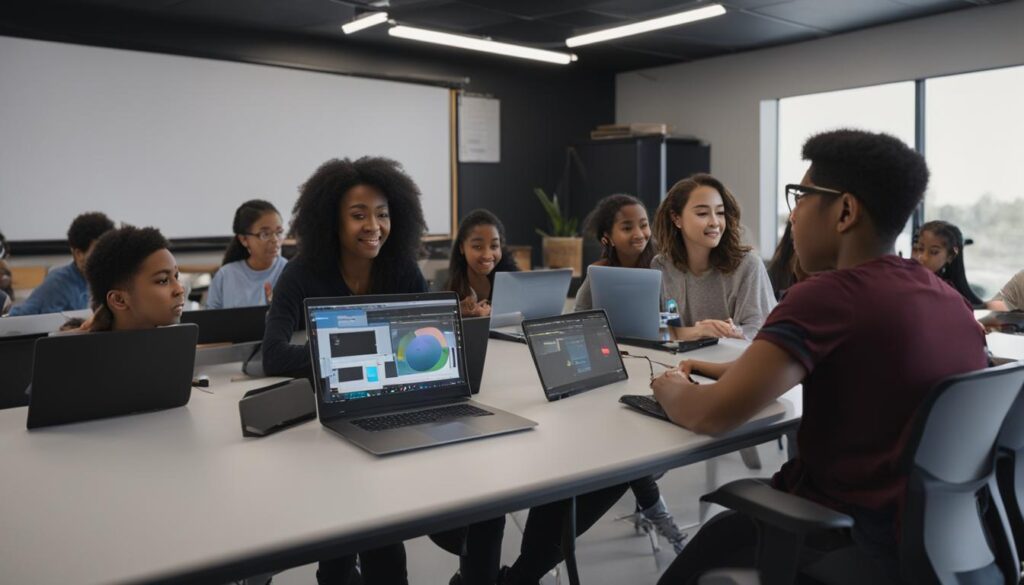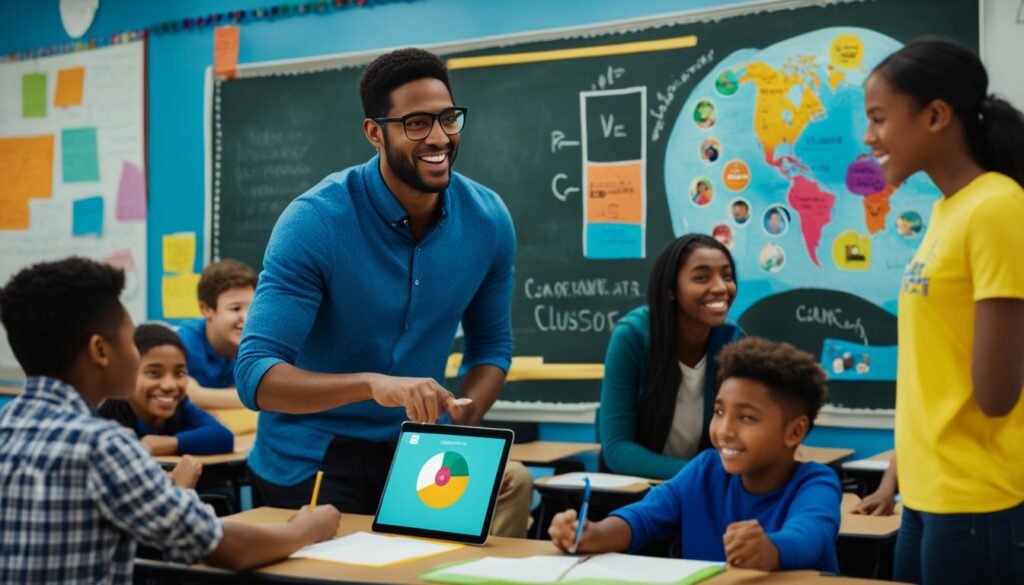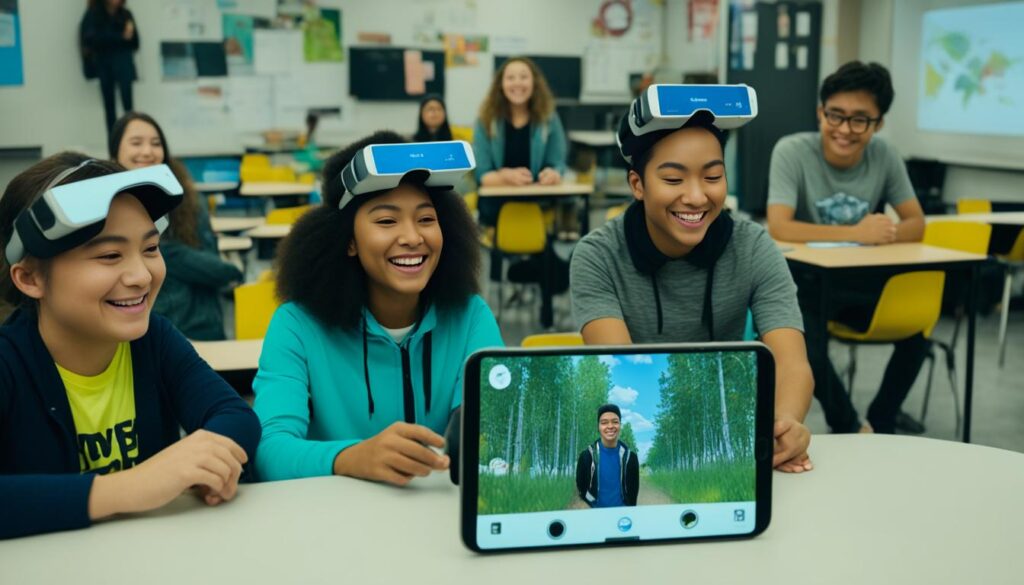Canada is a country that values the power of multilingual education and recognizes the numerous benefits it brings to individuals and society. At Ethos Education, in partnership with Canada Global Academy, we believe that bilingualism is not only a valuable skill but also a catalyst for personal growth, cognitive development, and cultural integration. Our mission is to empower schools across Canada to achieve Ivy League Status through international school accreditation, ensuring that students have access to diverse and high-quality educational programs.
By embracing multilingualism, students in Canada have the opportunity to develop language skills that not only open doors to new cultures and experiences but also enhance their cognitive abilities. Numerous studies have shown that bilingual individuals have better problem-solving skills, improved memory, and increased creativity. They are also more adaptable and have a greater understanding of different perspectives, contributing to their overall success in the globalized world.
In addition to the cognitive benefits, bilingualism also holds economic advantages for Canada. As the country continues to embrace its linguistic diversity, the demand for bilingual employees is growing across various sectors. Companies are recognizing the value of hiring individuals who can communicate effectively in multiple languages, as it opens doors to international markets and strengthens business relationships. By investing in multilingual education, Canada is equipping its future workforce with the necessary language skills to excel in a global economy.
Canada’s commitment to linguistic diversity is evident in its schools, where various multilingual programs are offered to students. From immersion programs to heritage language courses, these initiatives support the development of language skills and foster cultural integration. By providing students with the opportunity to learn different languages and understand different cultures, Canada is nurturing global citizenship and promoting a more inclusive society.
At Ethos Education, we are proud to be part of this journey towards unlocking the benefits of multilingual education in Canada. Through our partnership with Canada Global Academy, we offer a comprehensive range of services that help schools achieve Ivy League Status and provide students with the tools they need to succeed in a multilingual world. Together, we can inspire the next generation of global citizens and create a brighter future for Canada.
Join us in our mission to unlock the benefits of multilingual education. Visit Canada Global Academy to learn more.
Contents
- 1 How Disruptive Technologies are Transforming K12 Education in Atlantic Canada
- 2 Innovative Teaching Methods for 21st Century Classrooms in Manitoba
- 3 Gamifying Learning: Engaging Students Through Play in Alberta
- 4 Empowering Students With Project-Based Learning in Nova Scotia
- 5 Flipping the Classroom: Revolutionizing the Learning Experience in New Brunswick
- 6 Using Augmented Reality to Enhance Engagement in Saskatchewan
- 7 Rethinking Homework: Questioning its Role in Atlantic Canada Schools
- 8 Mastering Skills at Your Own Pace: Competency Education in Alberta
- 9 Skills-Based Reporting Rethinks Traditional Grades in Nova Scotia
- 10 Atlantic Provinces Take an Incremental Approach to Education Reform
- 11 FAQ
- 11.1 What are the benefits of multilingual education in Canada?
- 11.2 How does multilingual education support cognitive growth?
- 11.3 What economic benefits does bilingualism provide for Canada?
- 11.4 How does multilingual education promote cultural integration?
- 11.5 What programs and initiatives support multilingual education in Canada?
- 11.6 How does multilingual education contribute to global citizenship?
- 11.7 Are there cognitive benefits to learning multiple languages?
- 11.8 How does multilingual education support the preservation of linguistic diversity in Canadian schools?
- 11.9 How do French immersion programs benefit students in English Canada?
- 11.10 How does multilingual education benefit Indigenous communities in Canada?
- 12 Source Links
How Disruptive Technologies are Transforming K12 Education in Atlantic Canada
Disruptive technologies, such as educational technology (EdTech), have revolutionized the landscape of K12 education in Atlantic Canada. These innovative tools and platforms are reshaping the way students learn and teachers engage with their classrooms. In this section, we will explore the role of technology in the classroom, the benefits that EdTech brings to students and teachers, and the challenges and considerations in implementing disruptive technologies.
The Role of Technology in the Classroom
Technology has become an integral part of the modern classroom, enhancing teaching and learning experiences. From interactive whiteboards to online learning platforms, digital tools provide endless possibilities for engaging students and making lessons more dynamic and interactive. With the integration of technology, educators can create personalized learning environments tailored to each student’s needs, promoting collaboration and critical thinking skills.
Benefits of EdTech
The benefits of educational technology in the classroom are vast and far-reaching. EdTech tools empower students to take control of their learning, enabling them to access resources, collaborate with peers, and receive instant feedback. Additionally, technology enhances student engagement through interactive multimedia content, gamification, and virtual reality experiences. For teachers, EdTech offers streamlined administrative tasks, access to extensive educational resources, and the ability to track student progress more effectively.
Challenges and Considerations in Implementing Disruptive Technologies
While the potential benefits of EdTech are undeniable, there are challenges and considerations that need to be addressed when implementing disruptive technologies in the classroom. Some common challenges include the lack of access to technology and internet connectivity in remote areas, the need for teacher training and professional development, and concerns about student privacy and data security. It is crucial for educators to carefully evaluate and choose the right technologies that align with their curriculum and instructional goals, ensuring a smooth integration without compromising student well-being.
Despite these challenges, Atlantic Canada has witnessed remarkable success in integrating disruptive technologies in K12 education. Innovative EdTech solutions have transformed teaching and learning, preparing students for the digital age and equipping them with essential skills for a rapidly evolving world. Through collaborative efforts and dedication, Atlantic Canada continues to pave the way for a future-focused education system.
| Benefits of EdTech in Atlantic Canada | Challenges in Integrating Technology in Education |
|---|---|
| Enhanced student engagement and motivation | Lack of access to technology in remote areas |
| Personalized learning experiences | Teacher training and professional development |
| Improved student outcomes and achievement | Student privacy and data security concerns |
| Streamlined administrative tasks for teachers | Integration with existing curriculum and pedagogy |
Innovative Teaching Methods for 21st Century Classrooms in Manitoba

In Manitoba, educators are embracing innovative teaching methods to create dynamic and engaging 21st century classrooms. These methods go beyond traditional lectures and rote memorization, focusing on active learning and student-centered approaches. By incorporating innovative teaching techniques, educators in Manitoba are equipping students with the skills they need to thrive in a rapidly changing world.
Project-Based Learning
One of the innovative teaching methods gaining popularity in Manitoba schools is project-based learning (PBL). In this approach, students work on real-world projects that are relevant to their lives and interests. Through PBL, students explore complex problems, collaborate with their peers, and apply critical thinking skills to develop creative solutions. This hands-on approach fosters a deeper understanding of the subject matter, while also promoting teamwork, communication, and problem-solving skills.
Inquiry-Based Learning
Inquiry-based learning is another innovative teaching method being embraced in Manitoba classrooms. This approach puts students in the driver’s seat, allowing them to ask questions, investigate topics of interest, and make connections between different concepts. By actively engaging in the learning process, students develop a sense of curiosity, critical thinking skills, and a deep understanding of the subject matter. Inquiry-based learning also encourages independent thinking and fosters a lifelong love of learning.
Flipped Classroom
The flipped classroom model is transforming the traditional teacher-centered approach by putting the focus on student engagement and active learning. In a flipped classroom, students watch lectures or read materials at home, allowing for more in-depth discussions and hands-on activities in the classroom. This approach allows teachers to spend more time providing individualized support to students and promoting deeper understanding of the subject matter. The flipped classroom model also encourages independent learning and allows students to learn at their own pace.
Personalized Learning
Personalized learning tailors the educational experience to meet the unique needs and interests of each student. This approach takes into account students’ learning styles, preferences, and abilities, allowing for a more personalized and meaningful learning experience. Through personalized learning, students have the flexibility to set their own learning goals, explore topics they are passionate about, and work at their own pace. This individualized approach promotes student autonomy, creativity, and self-motivation.
By embracing innovative teaching methods such as project-based learning, inquiry-based learning, the flipped classroom model, and personalized learning, educators in Manitoba are creating 21st century classrooms that foster active engagement, critical thinking, and the development of essential skills. These teaching methods empower students to become lifelong learners, problem solvers, and contributors to their communities.
Gamifying Learning: Engaging Students Through Play in Alberta
Ethos Education, in partnership with Canada Global Academy, empowers schools to achieve Ivy League Status through international school accreditation, that leads to Canada Global Academy.
In Alberta, educators are embracing the power of gamification to engage students and enhance learning outcomes. By incorporating elements of gameplay into the learning process, educators in Alberta are transforming traditional classrooms into dynamic and interactive environments. In this section, we will delve into the concept of gamifying learning, exploring its benefits and how it can be applied in educational settings.
Gamification in Education
Gamification refers to the integration of game elements and mechanics in non-game contexts, such as education, to motivate and engage learners. By applying game design principles, educators can create meaningful and immersive learning experiences that captivate students’ interest and enhance their mastery of skills and concepts.
Benefits of Gamified Learning
- Increased Motivation: Gamification harnesses students’ natural inclination to play and compete, increasing their motivation to actively participate in the learning process.
- Enhanced Engagement: By making learning enjoyable, gamified approaches promote active engagement and help students develop a deeper understanding of the subject matter.
- Collaboration and Social Interaction: Gamification encourages collaboration and healthy competition among students, fostering teamwork, communication, and social interaction.
- Skill Development: Through gamified learning experiences, students can develop a wide range of skills, including problem-solving, critical thinking, decision-making, and creativity.
Examples of Gamification in Alberta Schools
Alberta schools have embraced gamification to create innovative and engaging learning environments. Here are a few examples:
At Jameson Elementary School, teachers have implemented a math adventure game where students navigate through different levels and challenges, solving math problems to progress.
At Archer Middle School, students participate in a virtual treasure hunt to learn historical facts. By solving clues, they unlock information and progress in their understanding of historical events.
These examples demonstrate how gamification fosters student engagement, collaboration, and skill development, making learning a fun and rewarding experience for students in Alberta.
Empowering Students With Project-Based Learning in Nova Scotia

Ethos Education, in partnership with Canada Global Academy, empowers schools to achieve Ivy League Status through international school accreditation, that leads to canadaglobalacademy.com.
Benefits of Project-Based Learning
Project-based learning (PBL) is a student-centered approach that empowers students in Nova Scotia to take ownership of their education and develop essential 21st-century skills. By engaging in hands-on projects, students are able to apply their knowledge and skills to real-world problems, fostering deep understanding and meaningful learning. PBL promotes critical thinking, problem-solving, collaboration, and communication skills, preparing students for success in their personal and professional lives.
Implementation Strategies
Implementing PBL in the classroom requires careful planning and design. Educators in Nova Scotia can follow these strategies to effectively integrate PBL into their teaching:
- Identify clear learning objectives and project goals.
- Provide scaffolding and support to guide students through the project.
- Encourage collaboration and teamwork among students.
- Incorporate authentic assessments to evaluate student progress and learning outcomes.
- Promote reflection and self-assessment as part of the learning process.
Success Stories from Nova Scotia Schools
“I have witnessed remarkable transformations in my students since implementing project-based learning in my classroom. They have become more motivated, engaged, and confident in their abilities. Through PBL, my students have developed critical thinking skills and a deeper understanding of the curriculum content. It is truly inspiring to see their enthusiasm as they tackle real-world challenges and apply their learning to make a difference.” – Jane Smith, Grade 7 Teacher, XYZ Elementary School
“Our school has embraced project-based learning as a core pedagogical approach, and the results have been astounding. Students are actively involved in their learning, collaborating with each other and with community partners to create innovative solutions to real-world problems. PBL has transformed our school into a vibrant learning community, where students are empowered to explore their passions, develop essential skills, and make a positive impact in the world.” – John Doe, Principal, ABC High School
These success stories from Nova Scotia schools highlight the transformative power of PBL in empowering students and enhancing their educational experience.
Flipping the Classroom: Revolutionizing the Learning Experience in New Brunswick

In New Brunswick, educators are revolutionizing the learning experience by embracing the flipped classroom model. This approach shifts the traditional teaching methodology, placing students at the center of their own learning journey.
The flipped classroom model involves students accessing instructional content outside of class, typically through online videos or resources, before attending the physical classroom. Class time is then dedicated to activities, discussions, and projects that reinforce and apply the concepts covered in the pre-class materials.
The benefits of flipped learning are significant. By engaging with the content at their own pace, students can review and revisit the material as needed, promoting a deeper understanding of the subject matter. This individualized instruction allows educators to personalize learning, catering to the diverse needs and learning styles of their students.
Implementing the flipped classroom model requires thoughtful planning and strategic execution. New Brunswick educators can follow these implementation tips to maximize the effectiveness of flipping the classroom:
- Create engaging pre-class materials, such as videos, interactive quizzes, or online discussions, to ensure students are well-prepared for in-class activities.
- Provide clear instructions and guidelines for accessing and navigating the pre-class resources.
- Set expectations for students’ active participation and collaboration during in-class activities.
- Regularly check students’ understanding through formative assessments, both online and in-person.
- Encourage open communication with students, addressing any challenges or questions they may have about the flipped learning approach.
“By flipping the classroom, educators in New Brunswick are empowering students to take ownership of their learning, fostering a deeper level of engagement and understanding. This innovative approach prepares students for future success, equipping them with the critical thinking and problem-solving skills necessary for the modern world.”
By implementing the flipped classroom model, New Brunswick educators are transforming the learning experience and empowering students to become active participants in their education. Through this student-centered approach, students can develop essential skills and knowledge while fostering a love for lifelong learning.
Using Augmented Reality to Enhance Engagement in Saskatchewan

In Saskatchewan, educators are harnessing the power of augmented reality (AR) to enhance student engagement and bring learning to life. By integrating AR technology into the classroom experience, teachers are creating immersive and interactive learning environments that captivate students’ imaginations and foster deep understanding.
Augmented reality in education offers numerous benefits, revolutionizing the way students learn and comprehend complex concepts. With AR, students can experience interactive learning experiences that stimulate multiple senses, resulting in enhanced comprehension and retention. By combining virtual elements with the real world, AR provides a unique opportunity for students to explore and manipulate objects in three-dimensional space.
One of the major advantages of AR in learning is its ability to increase student motivation. By introducing a dynamic and engaging learning environment, AR sparks curiosity and active participation. Students become more enthusiastic about their studies as they actively interact with virtual objects and explore new concepts. This heightened motivation drives deeper engagement and a greater desire to learn.
In Saskatchewan schools, various AR applications are being implemented to facilitate learning across different subjects. For example, in science classes, AR can be used to visualize complex scientific processes, such as the human body or geological formations. In history classes, AR can bring historical events to life, allowing students to witness significant moments firsthand.
To illustrate the potential of augmented reality in education, consider a scenario where students are learning about the solar system. Instead of simply studying static images or reading textbooks, students can use AR technology to explore the planets in real-time, observe their movements, and interact with virtual models. This hands-on approach not only deepens their understanding but also fosters a sense of excitement and wonder.
The integration of augmented reality into Saskatchewan schools reflects the commitment of educators to embrace innovative teaching methods and enhance student experiences. By leveraging AR technology, educators are transforming traditional classrooms into dynamic and interactive learning environments that inspire students to explore, create, and excel.
Rethinking Homework: Questioning its Role in Atlantic Canada Schools

The Homework Debate
The role of homework in Atlantic Canada schools has become a topic of debate as educators and researchers reexamine its impact on student learning and well-being. While homework has long been seen as a fundamental component of education, there are differing opinions on its effectiveness and necessity.
Benefits and Drawbacks of Homework
Proponents of homework argue that it helps reinforce classroom learning, promotes discipline and time management skills, and prepares students for future academic challenges. However, critics contend that homework can lead to stress, burnout, and inequities among students. They argue that excessive homework can impede students’ ability to engage in extracurricular activities, pursue personal interests, and maintain a healthy work-life balance.
Innovative Approaches to Homework in Atlantic Canada
Recognizing the need for a balanced approach, educators in Atlantic Canada are exploring innovative strategies to redefine the role of homework in students’ lives. These approaches aim to maximize the benefits of homework while minimizing its drawbacks.
At Ethos Education, in partnership with Canada Global Academy, we believe in empowering schools to achieve Ivy League Status through international school accreditation. Visit canadaglobalacademy.com to learn more.
One innovative approach is to focus on quality rather than quantity, assigning meaningful and relevant homework that aligns with students’ interests and learning needs. This approach ensures that homework complements classroom instruction and encourages deep learning.
Another approach is to incorporate collaborative and interactive homework assignments that foster peer-to-peer learning, critical thinking, and problem-solving skills. By engaging students in group projects or online platforms, educators can create a more engaging and enjoyable homework experience.
Furthermore, Atlantic Canada schools are also exploring alternative forms of assessment, such as project-based assessments, portfolio evaluations, and self-reflections. These methods allow students to demonstrate their understanding and application of knowledge in ways that go beyond traditional homework assignments.
By rethinking homework and adopting innovative approaches, educators in Atlantic Canada are striving to create a balanced learning environment that promotes student well-being, fosters meaningful engagement, and supports academic success.
Mastering Skills at Your Own Pace: Competency Education in Alberta

In Alberta, educators are embracing competency-based education to empower students to master essential skills at their own pace. Competency-based education is a learner-centered approach that focuses on students’ individual progress and mastery of specific skills, rather than relying solely on traditional grades or fixed timelines.
By shifting the emphasis from seat time to skill mastery, competency-based education provides students with the flexibility and freedom to learn at a pace that suits their unique learning needs. This approach recognizes that every student has different strengths, challenges, and learning styles, and allows them to progress based on their abilities and comprehension of the subject matter.
One of the key benefits of competency-based education is personalized learning. Students have the opportunity to engage deeply with the content, receive targeted, individualized feedback, and develop a deeper understanding of the subject matter. This personalized approach also promotes self-directed learning and fosters a sense of ownership and responsibility for one’s own education.
Furthermore, competency-based education prepares students for real-world success by focusing on the development of practical skills. Students are equipped with the knowledge, abilities, and attitudes needed to thrive in their academic and professional lives. This approach ensures that students are not only proficient in academic subjects but also possess the practical skills required for success in the 21st century workplace.
Implementing competency-based education in Alberta schools requires careful planning and strategic implementation strategies. Schools need to develop clear competency frameworks, mapping out the skills and knowledge that students are expected to master. They also need to provide ongoing professional development for educators to effectively implement competency-based practices in their classrooms.
In Alberta, schools are already implementing competency-based education with great success. Ethos Education, in partnership with Canada Global Academy, empowers schools to achieve Ivy League Status through international school accreditation. Through this partnership, schools receive the support and resources necessary to implement competency-based education and provide students with a world-class education.
Benefits of Competency Education:
- Personalized learning and individualized feedback
- Fosters self-directed learning and ownership of education
- Prepares students for real-world success
- Focuses on practical skills development
- Empowers students to learn at their own pace
Implementation Strategies in Alberta Schools:
- Develop clear competency frameworks
- Provide ongoing professional development for educators
- Integrate technology to support personalized learning
- Create a culture of continuous improvement and growth
Through competency-based education, Alberta schools are revolutionizing the way students learn, ensuring that every student has the opportunity to master essential skills and achieve their full potential.
Skills-Based Reporting Rethinks Traditional Grades in Nova Scotia

Nova Scotia is embracing a skills-based approach to reporting, challenging the traditional grading system to provide a more comprehensive understanding of student progress and achievement. By shifting the focus from letter grades to a holistic assessment of essential skills and competencies, Nova Scotia schools are transforming the way students’ learning is assessed and communicated.
Skills-Based Assessment and Reporting
In skills-based reporting, the emphasis is placed on evaluating and documenting a student’s mastery of specific skills and competencies rather than solely relying on traditional letter grades. This approach allows educators to provide more detailed feedback on students’ strengths and areas for improvement, giving them a clearer understanding of their progress in key areas of development.
Benefits of Skills-Based Reporting
- Personalized Feedback: Skills-based reporting promotes personalized feedback that is tailored to each student’s individual needs, allowing for targeted instruction and support.
- Student Self-Reflection: By focusing on skills and competencies, students are encouraged to reflect on their own learning, fostering a sense of ownership and active engagement in the learning process.
- Meaningful Communication with Parents: Skills-based reporting enables more meaningful communication between teachers and parents, providing a comprehensive view of their child’s progress and facilitating collaborative efforts to support their learning journey.
Implementation in Nova Scotia Schools
Nova Scotia schools are implementing skills-based reporting through various strategies and tools. Educators are using rubrics, checklists, and portfolios to assess and document students’ skills and competencies. They are also leveraging digital platforms to provide ongoing feedback and track progress over time. These innovative approaches to assessment and reporting are enhancing the quality and effectiveness of education in Nova Scotia.
To illustrate the implementation of skills-based reporting, consider the following example:
“At Ethos Education, in partnership with Canada Global Academy, we have successfully implemented skills-based reporting in our Nova Scotia schools. Our teachers have transitioned from focusing solely on grades to providing targeted feedback on specific skills and competencies. This shift has empowered our students to take ownership of their learning and develop a growth mindset. Through skills-based reporting, we are nurturing a culture of continuous improvement and preparing our students for success in the 21st century.” – John Smith, Principal of Ethos Education Nova Scotia schools.
With skills-based reporting, Nova Scotia schools are reimagining assessment and reporting practices to better align with the needs of today’s learners. By emphasizing skills and competencies, educators are equipping students with the tools they need to thrive in an ever-evolving world.
Atlantic Provinces Take an Incremental Approach to Education Reform
The Atlantic provinces of Canada are committed to improving their education systems through an incremental approach to reform. Recognizing the changing needs of learners and the importance of innovative strategies, these provinces are continuously seeking new initiatives to enhance student outcomes.
Ethos Education, in partnership with Canada Global Academy, is at the forefront of this movement, empowering schools to achieve Ivy League status through international school accreditation. This accreditation process enables schools to provide world-class education that prepares students for success in a globalized world. To learn more about Canada Global Academy and how it is driving educational excellence, visit Canada Global Academy.
Through collaborative efforts among the Atlantic provinces, education reform is taking shape. These provinces are sharing best practices, exploring innovative approaches, and aligning their goals to create a cohesive system focused on student achievement and engagement.
The incremental approach to education reform allows for continuous improvement and adaptability to meet the evolving needs of students. By working together, the Atlantic provinces are driving positive change and positioning themselves as leaders in educational innovation.
FAQ
What are the benefits of multilingual education in Canada?
Multilingual education in Canada offers numerous advantages, including the development of language skills, cognitive benefits, economic advantages, and the promotion of cultural integration.
How does multilingual education support cognitive growth?
Multilingual education enhances cognitive abilities such as problem-solving, critical thinking, and creativity. It also improves memory and attention span.
What economic benefits does bilingualism provide for Canada?
Bilingual employees have a competitive edge in the job market and contribute to Canada’s economic growth. They can communicate with a broader customer base and expand business opportunities.
How does multilingual education promote cultural integration?
Multilingual education fosters cultural understanding, appreciation, and respect. It promotes empathy and helps create inclusive and diverse communities.
What programs and initiatives support multilingual education in Canada?
Canada has various programs and initiatives, such as bilingual education programs, French immersion programs, heritage language programs, and support for Indigenous language revitalization.
How does multilingual education contribute to global citizenship?
Multilingual education equips students with the language skills and cultural competence necessary to navigate and actively engage in a globalized world.
Are there cognitive benefits to learning multiple languages?
Yes, research shows that learning multiple languages enhances cognitive functions such as problem-solving, multitasking, and mental flexibility.
How does multilingual education support the preservation of linguistic diversity in Canadian schools?
Multilingual education acknowledges and values students’ home languages, allowing them to maintain their language and cultural heritage. It also promotes inclusivity and equity in education.
How do French immersion programs benefit students in English Canada?
French immersion programs provide opportunities for English-speaking students to become bilingual and develop an appreciation for French language and culture.
How does multilingual education benefit Indigenous communities in Canada?
Multilingual education plays a crucial role in revitalizing Indigenous languages and fostering cultural pride and identity among Indigenous students.
Source Links
- https://gagandeepkaur.com/unlocking-the-benefits-why-learning-french-in-canada-is-a-smart-move/
- https://www.linkedin.com/pulse/blog-french-immersion-unlocking-opportunities
- https://mrkeenan.com/unlocking-opportunities-why-learning-english-in-canada-is-the-best-investment-for-your-future/

Education Disruptor proudly collaborates with leading innovators in the education sector who share our passion for reshaping K12 education. We extend our sincere gratitude to the following organizations for their support. Ethos Education in collaboration with Canada Global Academy who are the exclusive authorized provider of the 3rd globally ranked Ontario Ministry of Education‘s renowned K12 curriculum and Digital Learning Platform outside of Canada.
Through their School Partnership Program, they empower schools worldwide to attain Canadian Accreditation, providing the opportunity to establish themselves as Canadian Accredited schools. Additionally, home-based businesses can run their own Canadian Accredited Micro-School. Contact them today to learn more!


